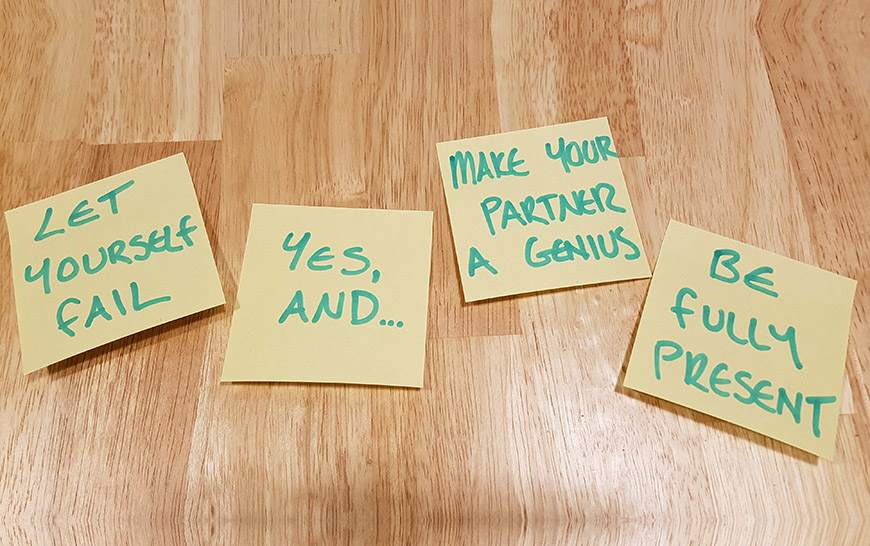In
Part 1 of this two-part blog, we covered these principles:
- let yourself fail
- say “yes and”
Part 2 looks at how Improv can reframe the way you interact with others.
Make your partner look and feel like a genius
People often say to me ‘It must be terrifying to do improv, there’s so much pressure to be funny’. Yet, Improv is really about the collective contribution of the group – not you as an individual. There’s nothing more irritating than someone in an improv scene on their own agenda and taking the attention away from the group. This irritation might be familiar in the office too!
The focus instead lies on how to set your scene partners up for them to be in the best possible light. How you can make it easy for them to add something to whatever you’ve just said.This completely takes the pressure off you so you relax and just focus better on being present in the scene. What’s more, if everyone is trying to make each other look good, there’s a good chance everyone succeeds!
At work, we can so often be worried about our own performance – we tend to have individual appraisals and targets. However, no one ever really achieves anything alone. Our culture applauds the lone genius but Einstein, Edison and Jobs – they all had teams of people helping them! Ideas were honed through collaboration and discussions.
Improv encourages us back towards the creative power of the group. At work we can often feel that should never present an idea until it’s a fully formed and ‘perfect’. It’s a real creativity inhibitor. Instead, sharing and building ideas as a collective allows them to evolve into so much more than one mind could have created on their own.
Be fully present
There is no more important skill in improv than listening! When you’re in a performance, you have to be so fully present because new details are flying around you by the second – everyone suddenly has new names, are in new settings with new scenarios! If you miss the details, the audience is going to notice.
In real life however, we often listen only to respond. When someone is talking, we are busy formulating our reply rather than intently tuning in. We miss so much detail that way. There are many improv games and exercises, which challenges us to listen to every single word our partners say. It’s enlightening.
In business, imagine if everyone listened in an ‘improv’ way to colleagues, clients and stakeholders. It not only reduces the chance of creating products no-one wants or marketing campaigns that miss the point. It’s deeper than that. If you truly listen to someone, they feel heard – one of our basic human needs. It changes the way someone feels about you.
So not only do you give someone the gift of being heard, you also get access to a lot more accurate information to enable better decisions. It’s something you need to actively switch on though. Honing these skills in the improv classroom gives you a better chance of activating this ‘listening mode’ in any meeting or important conversation.
A final word
The real beauty of Improv is not in any one of these principles but in the alchemy when they are all in force together! Imagine – you are not afraid to share an idea because your team-mates have got your back. Ideas grow into something because everyone ‘yes, ands’ what is offered. Solutions develop and evolve. Everyone is fully listening and responding to each other in an attentive way.
I grant you this may still seem like a distant fantasy for the office. Yet, what if
you chose to just implement some of these for yourself? What would that do for your performance? How would it change how others viewed you?
What’s more, it’s a more joyful approach to work. Improv advocates permission to ‘play’ again. It’s an extremely fun way to refine the very best of human skills.
For more information on how to bring Improv into your office or team,
get in touch with Nicola.







0 Comments